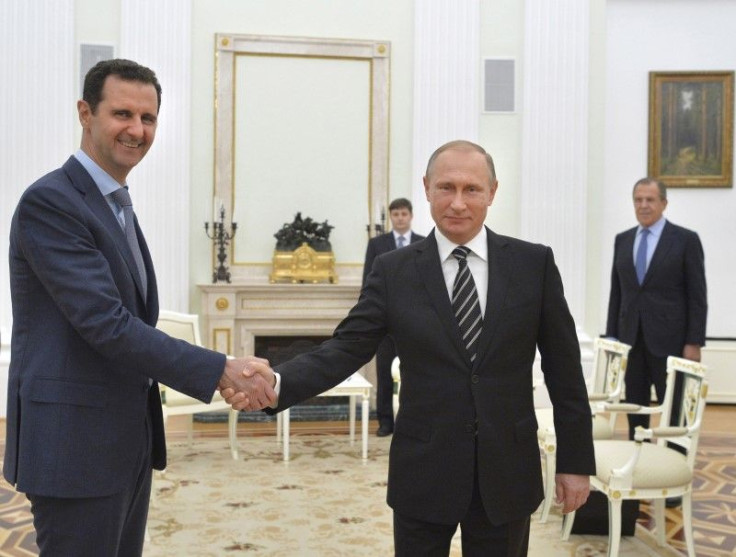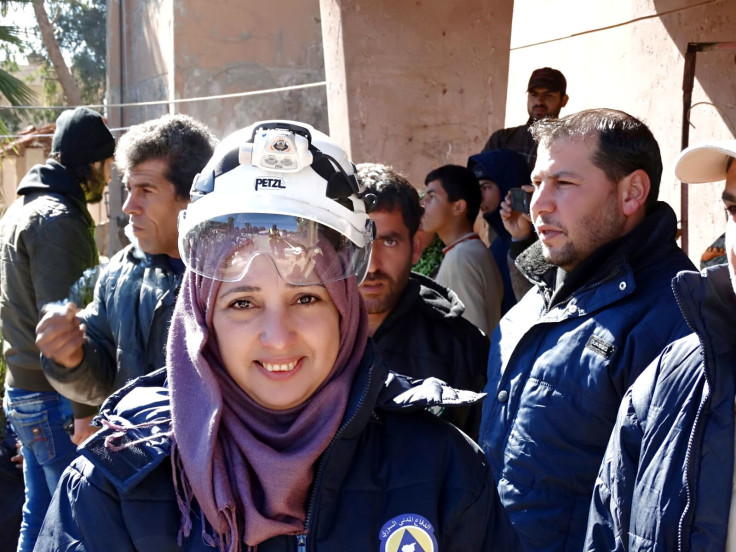Russia’s Withdrawal From Syria Will Not Mark The End Of The Bombs

BEIRUT— Russia’s surprise announcement Monday that it was withdrawing the majority of its forces from Syria, on the fifth anniversary of the civil war, has garnered international attention and much discussion about the long-term implications of such a move. But those inside the war-torn country are waiting to see the results Moscow’s decision will have on the humanitarian crisis: Will bombs continue to fall on Syria’s citizens when Russia leaves?
Russia’s move has been viewed by many as a political push from President Vladimir Putin to speed up negotiations for a political solution to the crisis — one that may involve a transitional government with the regime and representatives from the opposition. But, on the ground, the withdrawal does not spell out a win for either side nor does it promise an end to the fighting that has killed more than 300,000 people.
“I do not think that Russia’s withdrawal from Syria is because there is a peaceful and political solution. Russian intervention resulted in progress of the Syrian regime, but it is just behind more death and destruction among civilians,” Manal, a 32-year-old volunteer rescue worker with the Syrian Civil Defense in the southern province of Daraa, told International Business Times. “I wish I could say there is [going to be] a political solution in Syria, but I do not think that this will be resolved anytime soon.”

Russia began bombing in Syria last October on the public premise of fighting terrorism, but the addition of Moscow’s air force in the war primarily led to significant and widespread gains for the Syrian regime. As of Feb. 1, Russian airstrikes had killed at least 1,500 civilians, according to the Syrian Network For Human Rights (SNHR) . But, even without ancillary backing from Russia, the Syrian regime has its own air force, the support of the Iranian regime and that of thousands of Iran-backed militias who are fighting both Syrian rebel forces and terrorist organizations such as the Islamic State group and al Qaeda branch Jabhat al-Nusra.
Around two-fifths of the civilians killed by Syrian and Russian bombs in 2015 were women and children, according to SNHR. The Syrian regime has been accused of stepping up barrel bombs attacks in Syria since Russia began its military operation, which account for the majority of civilian fatalities since the improvised explosive devices are dropped from helicopters that cannot be guided as they fall.
“I think the number of casualties will be reduced to a certain extent because the aircraft [are leaving],” Manal said, adding that she worried the void left by Russia would be filled with “more destruction and killing from Syrian aircraft.”
In Aleppo, Syria’s largest city, opposition fighters shared Manal’s concern about the aerial bombardments in addition to concern over ground battles. Omar Khatab, a northern Aleppo-based fighter with Ahrar al-Sham told IBT that Russia’s withdrawal “won’t stop the bombs and Bashar Assad. There is Iran, Iraq, Hezbollah. For five years Assad and Iran killed the people in Syria.”
Iran has been the embattled Syrian president’s biggest backer in the war: In addition to supplying money, weapons, and several thousand of its own Revolutionary Guards, Tehran has dispatched other groups of fighters to Syria under Iranian control. Iranian-backed Lebanese Shiite group Hezbollah has anywhere between 2,000 and 5,000 fighters in Syria and over the last few months thousands of Iraqi Shiite militiamen have been deployed to country’s most brutal battlefields.
By the end of last year, Russia’s airstrikes had led to a significant change in the Syrian fighting dynamic. Pro-regime forces along with Iran-backed militias were able to seize territory in the provinces of Aleppo, Daraa and the Damascus suburbs that were previously held by Syrian opposition groups instead of focusing on repelling their advances.
Their successes have hinged on one particular military strategy: heavy Russian airstrikes weakening an area over time and providing cover for an initial ground operation by ground forces including Hezbollah, the Syrian army and Iran’s IRGC troops. Once the initial offensive begins, thousands of Iran-backed militants enter the area and carry out street-level attacks.

These street-to-street ground troops are unlikely to leave Syria or depart from their currently winning strategy. Moreover, opposition groups and terrorist groups in Syria have also vowed to continue the fight. Nusra issued a statement Tuesday in response to Putin’s announcement that Russia’s mission in Syria was a “success,” calling the withdrawal a “defeat” for the Russians. The group also vowed to capitalize on Russia’s withdrawal by launching a new offensive in Syria within 48 hours.
But humanitarian organizations are cautiously hopeful that the withdrawal of Russian forces will lead to a brief respite for relief agencies to deliver much-needed aid.
“Fewer jets in the air and fewer bombs means more opportunities for Mercy Corps to get trucks in,” Christy Delafield, senior global communications officer at Mercy Corps, a USAID-funded NGO told IBT. “But we need to be realistic about the situation. The Russians aren’t the only ones in the airspace.”
Intense fighting on the ground and heavy airstrikes have prevented much needed humanitarian aid from reaching particularly vulnerable areas “too frequently,” Delafield added.
Even after the implementation of a “cessation of hostilities” earlier this month, Mercy Corps had to delay or reroute aid shipments because of local ground fighting rather than Russian airstrikes.
Russia is not completely out of the picture since it will continue to operate its naval base in the coastal city of Tartus, with its advanced S-400 surface to air missile system, and according to AFP, continue to strike “terrorist targets” in Syria. The Syrian regime considers all opposition groups to be terrorists and in the past, Russia has also targeted rebel groups that are not affiliated with ISIS or Nusra.
“I think [Putin’s announcement] is to force Bashar Assad on a political solution and to gain the trust of the opposition,” Ahmad Arag, a spokesman for the Syrian Democratic Forces, a U.S.-backed opposition coalition of Syrian rebel and Kurdish fighters. “But Russia will not go. Russia fooled everyone.”
As Syrian state TV showed footage of Russian forces leaving the country Tuesday, pro-regime forces were able to make significant gains around the ISIS-controlled Syrian city of Palmyra under cover of Russian airstrikes, according to al-Manar, a pro-Hezbollah news outlet.
But Russia’s move has more to do with exercising its political power than it does with the state of the regime’s forces. Hadi Abdalhadi Alijla, director of the Institute for Middle East Studies Canada, told IBT that Moscow could push Assad and Iran to accept a political solution to end the crisis that is in line with U.S. goals.
“There is a plan by America and Russia for a political solution in Syria, for a participatory government and a transitional government without Bashar Assad,” Arag said.
The political solution on the table is one of a temporary government that would eventually lead to Assad’s removal. The U.S. has been pushing for this end for the better part of a year and now. Russia looks closer to being behind it, but it puts Russia’s goals at odds with those of Syria and Iran.
“[Russia’s] goal was to back the regime and give them support ... this has been achieved and the regime gained self-confidence and are protecting the Syrian regime bases,” Alijla told IBT.
“At the same time, Putin wants to tell Assad and Tehran, that ‘I lead the game, not only you. I decide the game with the West. You listen to me.’”
© Copyright IBTimes 2024. All rights reserved.





















